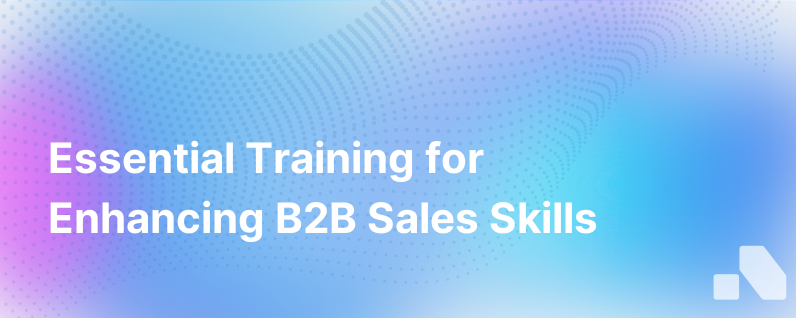
In the high-stakes world of business-to-business (B2B) sales, the ability to close deals and foster long-term relationships isn't just a function of natural charisma or persistence; it is also a discipline that can be cultivated through rigorous training. According to the Association for Talent Development, companies that offer comprehensive training programs have 218% higher income per employee than companies without formalized training, which showcases its undeniable impact. For B2B sales teams, the role of training is even more pronounced due to the complex nature of the sales cycles and the high level of customization required for each client.
The Dynamic B2B Sales Environment
B2B selling is a distinct landscape marked by extended sales cycles, larger deal sizes, and a need for in-depth product knowledge. Sales reps in this arena must understand complex business problems and offer solutions that can involve multiple stakeholders and layers of decision-making. This places an elevated importance on a sales rep's ability to consult, negotiate, and manage relationships proficiently.
Training as the Gateway to Mastery
Training in B2B sales encompasses several key areas:
Product Knowledge and Industry Expertise
Sales reps must thoroughly understand the products or services they're selling to confidently address any queries or concerns that might arise. Moreover, proficiency in the specific industry nuances of their clients allows them to speak the same language as decision-makers, which sets the stage for credibility and trust. Regular training sessions, therefore, should include deep dives into product features, updates, industry trends, and competitor analysis.
Strategic Selling Skills
Successful B2B sales require approaching each potential buyer with a strategic mindset. Training can develop a rep's ability to identify key decision-makers, understand the buyer's journey, and tailor the sales pitch to resonate with each unique stakeholder. Key strategic selling skills include account mapping, pipeline management, and forecasting, all of which can be honed through scenario-based training exercises.
Consultative Selling Techniques
Modern B2B sales revolve around the concept of creating value for the client, rather than simply pushing a product. Consultative selling, a technique that emphasizes understanding a potential buyer's challenges and offering solutions, is at the core of B2B sales strategies. Training initiatives that involve role-play, real-world case studies, and effective questioning techniques are indispensable for developing these skills.
Advanced Communication and Interpersonal Skills
A B2B sales process is highly interpersonal, involving several levels of interactions. Training programs must address not only the verbal communication required during sales presentations and negotiations but also the soft skills essential for building rapport. These soft skills allow reps to navigate complex organizational structures and nurture relationships that are crucial for sales success.
Leveraging Technology and Data
In an increasingly data-driven world, B2B sales reps must be adept at utilizing customer relationship management (CRM) tools and interpreting sales data to inform strategies. Training reps on how to use technological tools effectively can maximize efficiency and provide valuable insights into customer behaviors and preferences.
Continuous Learning and Adaptation
The best B2B sales training programs are designed for continuous learning and iteration. They often include a combination of in-house training, external workshops, and even e-learning platforms that offer flexibility and accessibility. Furthermore, they are adaptive, evolving with new sales techniques and technologies to remain current and effective.
The Follow-Up: Coaching and Mentoring
Training does not end at the conclusion of a session or module. Ongoing coaching and mentoring ensure that the skills learned during training are applied in the field. Sales managers play a crucial role as coaches, providing feedback based on direct observation of sales calls and meetings, thus making real-time adjustments that lead to performance improvements.
Measuring the Impact of Training
Quantifying the success of B2B sales training entails looking at a host of metrics beyond simple sales numbers. These include improvements in the length of the sales cycle, conversion rates at various stages of the funnel, customer retention rates, and overall customer satisfaction. Periodic skill assessments and feedback loops also contribute to a comprehensive evaluation of training effectiveness.
Conclusion
In summary, the role of training in developing B2B sales skills cannot be overstated. Comprehensive, ongoing training programs set the foundation for an adept sales force capable of navigating the complexities of B2B transactions with skill and finesse. Through these programs, startups and established enterprises alike can empower their teams, refine their sales strategies, and ultimately, drive sustainable growth.
It is this level of commitment to constant innovation and development—principles deeply embedded in platforms like Aomni—that ensures B2B sales organizations can not only compete but thrive in today’s dynamic business landscape.
Sources:
- How do you measure your sales training success against other organizations?
- Sales Enablement Guide: How to measure Sales training effectiveness using these core 7 KPIs
- How to Measure the Success of Sales Training
- B2B Sales Training Techniques and Best Practices
- B2B Sales Training in the Digital Age: A Guide for Success
- 7 Essential Sales Skills Required for B2B Organizations
- B2B Sales Training Best Practices: Learning from Industry Leaders
- The Ultimate Guide to B2B Sales Training: Strategies, Techniques, Best Practices | The Sales Blog